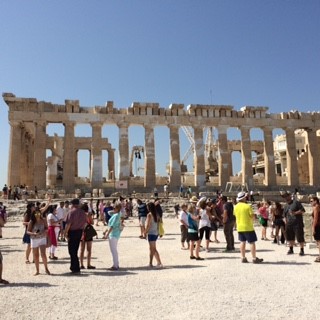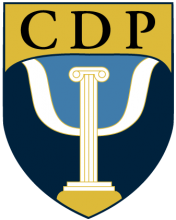Staff Perspective: Summer Vacation: The Benefits of “Exposure”
For most of us, summer conjures up the idea of vacation. Whether it is going to the beach, traveling to a foreign country or experiencing Disney World, vacation allows us to take a break from our everyday life including work. It’s no big secret that there are numerous benefits associated with taking a vacation, like stress relief, special family time, and mental and physical rest – to name just a few. Sometimes merely planning a vacation promotes anticipation and excitement.
According to the Merriam Webster Dictionary (www.merriam-webster.com/dictionary/vacation), vacation is defined as:
- a respite or a time of respite from something
- a scheduled period during which activity is suspended
- a period of exemption from work granted to an employee
- a period spent away from home or business in travel or recreation
- an act or an instance of vacating
Rather than thinking of vacation as only a time for leaving behind something stressful or routine, I have come to see it as an opportunity for proactively adding to my treasure chest through real life exposures. Yes, the kind we refer to in Prolonged Exposure (PE) Therapy.
 When I went to Greece recently it was to let go of the monotony and humidity of Washington, D.C., as well as the stress of finally completing a big team project (the Summer Institute). Upon reflection, merely relinquishing these stressors wasn’t all that rejuvenated me. Gaining positive experiences from this vacation also inspired me. Indeed, through several in vivo exposures in Greece, I gained more than I could hope for.
When I went to Greece recently it was to let go of the monotony and humidity of Washington, D.C., as well as the stress of finally completing a big team project (the Summer Institute). Upon reflection, merely relinquishing these stressors wasn’t all that rejuvenated me. Gaining positive experiences from this vacation also inspired me. Indeed, through several in vivo exposures in Greece, I gained more than I could hope for.
For example:
- Immersing myself in one of the world’s most incredible cities (Athens) and two of the most beautiful Greek islands (Mykonos and Santorini) involved taking different ferries and public busses, hiking unfamiliar cobble streets alongside donkeys, struggling with maps, trying gyros and Greek salads from street vendors, and asking directions from people whose economy was collapsing. Through repeated practice, however, overcoming these challenges gave me a sense of self-mastery. Once I was able to reach my destinations and explore within each locale, I felt happy and successful. Far removed from my DC life, I found these mini-successes in a foreign land liberating and rewarding. And yes, it was a big struggle laying at the pool, walking on the beach, reading, and people watching!

- Seeing the ancient ruins of the Acropolis shifted my American-centric perspective – at least temporarily. I couldn’t help but be transported into a different world by the absolute beauty of antiquity including the most breathtaking museum (the New Acropolis Museum) I’ve ever seen, replete with Greek artifacts.
- Naturally, being exposed to the generous spirit of the Greek people gave me pause for gratitude and appreciation. At the end of my vacation when I was in Santorini, I realized about 10 p.m. that I had left my credit card at the last place where I had shopped in a small beach town about 45 minutes away. Recognizing it was far too late to take the bus back to retrieve it, I asked the concierge if he could call the store. I was surprised to learn that not only was he familiar with it, but his cousin worked there. He proceeded to call and confirmed they had my credit card. Then without hesitation he told me he would stop by the shop later, pick it up and return it to me the next morning before I left. I thanked him profusely, but he reassured me it wasn’t a big deal. As promised, the next morning he gave me the credit card without thinking for a second what a generous thing he had done for me.
 Like our PE patients, I’ve learned that by jumping into new situations or cultures and truly experiencing unfamiliar places like Greece, you discover unforeseen goodness and beauty in the world and people. You also learn that you can literally walk among ancient ruins.
Like our PE patients, I’ve learned that by jumping into new situations or cultures and truly experiencing unfamiliar places like Greece, you discover unforeseen goodness and beauty in the world and people. You also learn that you can literally walk among ancient ruins.
So the next time you take a vacation, think of it not only as a respite from something but also as an experiential windfall you can bring home. Then tuck these treasures in your chest and pull them out whenever life stressors are getting the best of you.
Signing off until the next trip…
Respond to this blog by sharing your own vacation “exposures.”
Paula Domenici, Ph.D., is a licensed Counseling Psychologist working as the Director of Civilian Training Programs at the Center for Deployment Psychology (CDP) at Uniformed Services University of the Health Sciences in Bethesda, Maryland. At the CDP, she oversees all civilian courses and training programs, and develops and presents workshops on deployment-related topics for military and civilian clinicians across the country.
For most of us, summer conjures up the idea of vacation. Whether it is going to the beach, traveling to a foreign country or experiencing Disney World, vacation allows us to take a break from our everyday life including work. It’s no big secret that there are numerous benefits associated with taking a vacation, like stress relief, special family time, and mental and physical rest – to name just a few. Sometimes merely planning a vacation promotes anticipation and excitement.
According to the Merriam Webster Dictionary (www.merriam-webster.com/dictionary/vacation), vacation is defined as:
- a respite or a time of respite from something
- a scheduled period during which activity is suspended
- a period of exemption from work granted to an employee
- a period spent away from home or business in travel or recreation
- an act or an instance of vacating
Rather than thinking of vacation as only a time for leaving behind something stressful or routine, I have come to see it as an opportunity for proactively adding to my treasure chest through real life exposures. Yes, the kind we refer to in Prolonged Exposure (PE) Therapy.
 When I went to Greece recently it was to let go of the monotony and humidity of Washington, D.C., as well as the stress of finally completing a big team project (the Summer Institute). Upon reflection, merely relinquishing these stressors wasn’t all that rejuvenated me. Gaining positive experiences from this vacation also inspired me. Indeed, through several in vivo exposures in Greece, I gained more than I could hope for.
When I went to Greece recently it was to let go of the monotony and humidity of Washington, D.C., as well as the stress of finally completing a big team project (the Summer Institute). Upon reflection, merely relinquishing these stressors wasn’t all that rejuvenated me. Gaining positive experiences from this vacation also inspired me. Indeed, through several in vivo exposures in Greece, I gained more than I could hope for.
For example:
- Immersing myself in one of the world’s most incredible cities (Athens) and two of the most beautiful Greek islands (Mykonos and Santorini) involved taking different ferries and public busses, hiking unfamiliar cobble streets alongside donkeys, struggling with maps, trying gyros and Greek salads from street vendors, and asking directions from people whose economy was collapsing. Through repeated practice, however, overcoming these challenges gave me a sense of self-mastery. Once I was able to reach my destinations and explore within each locale, I felt happy and successful. Far removed from my DC life, I found these mini-successes in a foreign land liberating and rewarding. And yes, it was a big struggle laying at the pool, walking on the beach, reading, and people watching!

- Seeing the ancient ruins of the Acropolis shifted my American-centric perspective – at least temporarily. I couldn’t help but be transported into a different world by the absolute beauty of antiquity including the most breathtaking museum (the New Acropolis Museum) I’ve ever seen, replete with Greek artifacts.
- Naturally, being exposed to the generous spirit of the Greek people gave me pause for gratitude and appreciation. At the end of my vacation when I was in Santorini, I realized about 10 p.m. that I had left my credit card at the last place where I had shopped in a small beach town about 45 minutes away. Recognizing it was far too late to take the bus back to retrieve it, I asked the concierge if he could call the store. I was surprised to learn that not only was he familiar with it, but his cousin worked there. He proceeded to call and confirmed they had my credit card. Then without hesitation he told me he would stop by the shop later, pick it up and return it to me the next morning before I left. I thanked him profusely, but he reassured me it wasn’t a big deal. As promised, the next morning he gave me the credit card without thinking for a second what a generous thing he had done for me.
 Like our PE patients, I’ve learned that by jumping into new situations or cultures and truly experiencing unfamiliar places like Greece, you discover unforeseen goodness and beauty in the world and people. You also learn that you can literally walk among ancient ruins.
Like our PE patients, I’ve learned that by jumping into new situations or cultures and truly experiencing unfamiliar places like Greece, you discover unforeseen goodness and beauty in the world and people. You also learn that you can literally walk among ancient ruins.
So the next time you take a vacation, think of it not only as a respite from something but also as an experiential windfall you can bring home. Then tuck these treasures in your chest and pull them out whenever life stressors are getting the best of you.
Signing off until the next trip…
Respond to this blog by sharing your own vacation “exposures.”
Paula Domenici, Ph.D., is a licensed Counseling Psychologist working as the Director of Civilian Training Programs at the Center for Deployment Psychology (CDP) at Uniformed Services University of the Health Sciences in Bethesda, Maryland. At the CDP, she oversees all civilian courses and training programs, and develops and presents workshops on deployment-related topics for military and civilian clinicians across the country.

